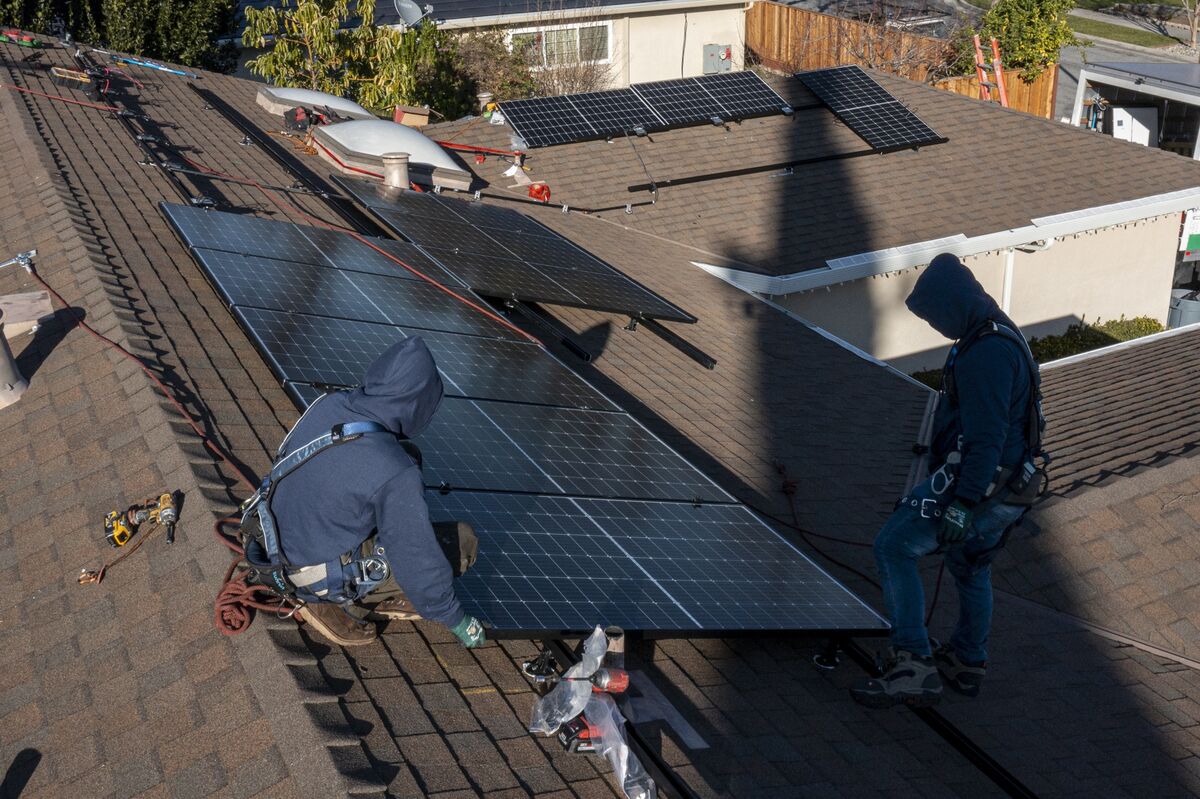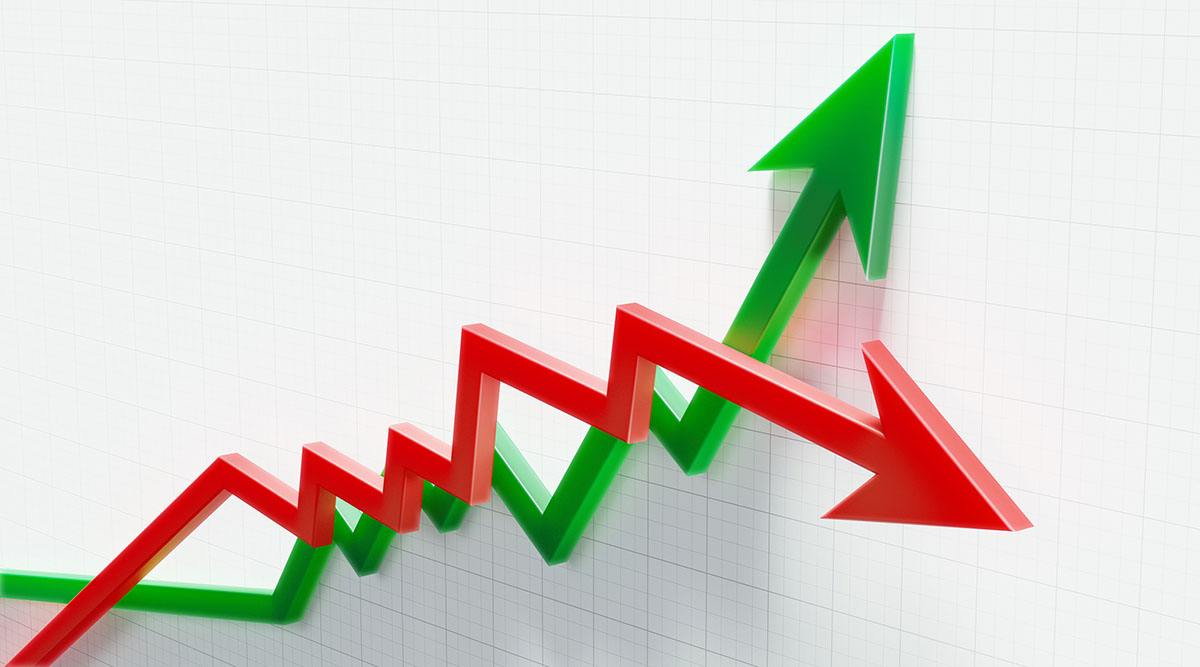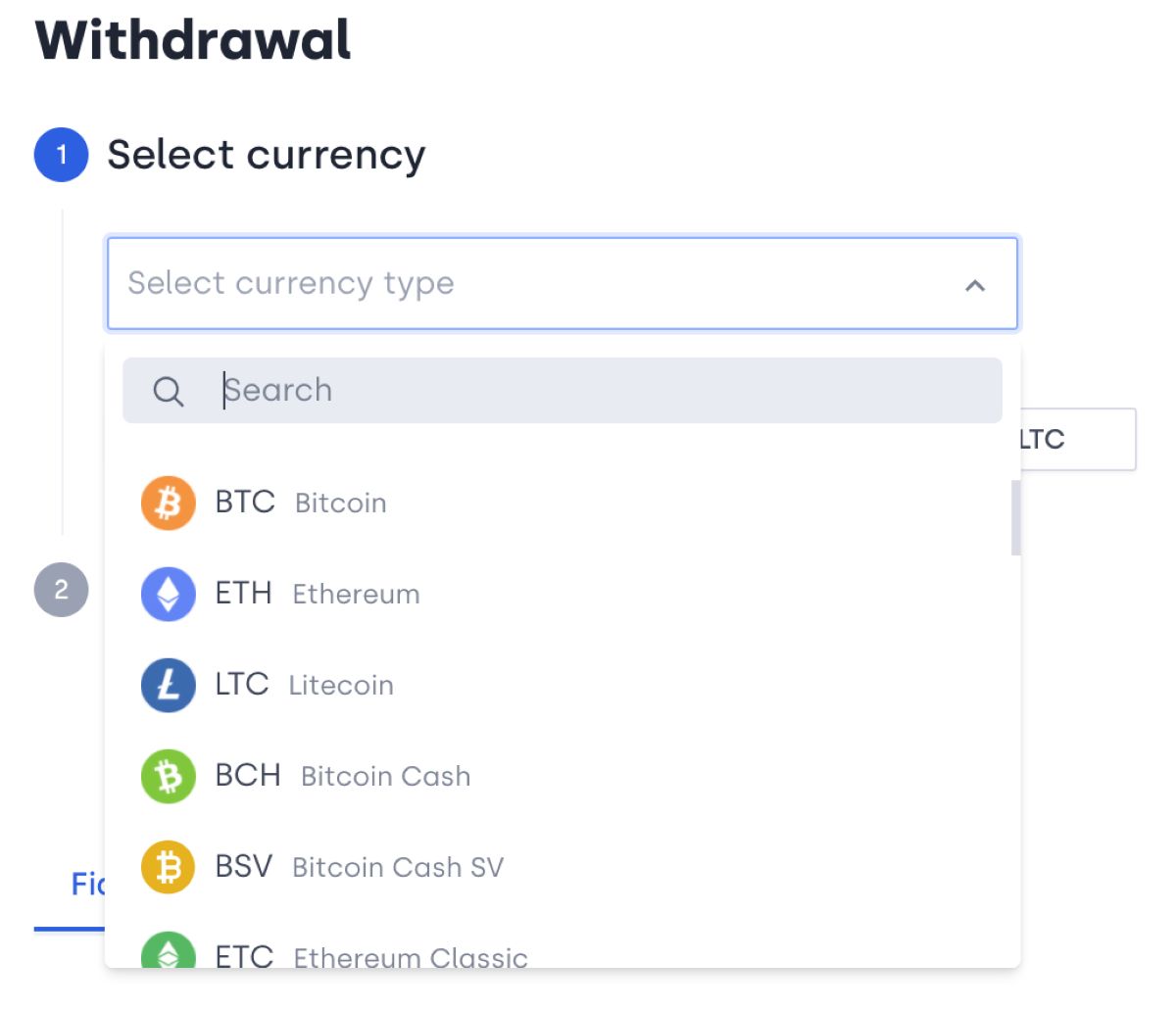

Finance
Why Are Solar Stocks Down
Published: January 19, 2024
Discover the reasons why solar stocks are down and how this impacts the finance industry. Stay informed about the latest trends and insights in the finance and renewable energy sectors.
(Many of the links in this article redirect to a specific reviewed product. Your purchase of these products through affiliate links helps to generate commission for LiveWell, at no extra cost. Learn more)
Table of Contents
Introduction
Solar stocks have recently experienced a downward trend, leaving investors concerned about the future of the industry. The renewable energy sector has gained significant traction in recent years, with solar power leading the charge. However, the volatile nature of the stock market, combined with various market dynamics, has led to a decline in solar stocks. In this article, we will explore the factors contributing to the downturn, including rising competition, policy changes, declining incentives, technological advancements in other energy sources, and the impact of the economic slowdown on investor sentiment.
The renewable energy sector, particularly solar energy, has been seen as a promising investment opportunity due to its potential to reduce carbon emissions and combat climate change. Solar energy is clean, abundant, and sustainable, making it an attractive option for countries and businesses looking to transition to a greener future. However, despite the long-term potential and benefits of solar energy, the industry is currently facing some challenges that have impacted the performance of solar stocks.
It is important to note that stock market fluctuations are a natural part of any investment landscape. However, understanding the specific factors influencing solar stocks can help investors make informed decisions and navigate through these uncertain times.
Market Overview
The solar energy market has experienced significant growth over the past decade, driven by a combination of factors such as increasing global energy demand, environmental concerns, and government support for renewable energy development. This growth has attracted both investors and industry players, leading to an expansion in the solar sector.
However, recent market trends have shown a decline in solar stocks, causing investors to question the stability and profitability of the industry. This shift in market sentiment can be attributed to several factors affecting the solar energy market.
Firstly, the market is becoming increasingly competitive, with a growing number of companies entering the solar industry. This surge in competition has led to price wars and squeezed profit margins for solar companies. As a result, investors are concerned about the long-term sustainability and profitability of solar stocks.
Secondly, policy changes and uncertainty surrounding government support for renewable energy have impacted the solar market. In some cases, government subsidies have been reduced or removed, making it more challenging for solar companies to attract investments and maintain profitability. Furthermore, changes in political leadership and shifts in energy policies can create uncertainty that deters investors from putting their money into the industry.
Another factor impacting solar stocks is the declining renewable energy incentives. Many countries have implemented feed-in tariffs and other incentive programs to stimulate the growth of solar energy. However, as the cost of solar technology has decreased, governments are gradually phasing out these incentives, which can negatively affect the profitability of solar companies and, in turn, their stock performance.
Lastly, technological advancements in other energy sources, such as wind power and natural gas, are posing as viable alternatives to solar energy. These advancements, coupled with the increasing efficiency and cost-effectiveness of these technologies, have diverted some investor attention away from solar stocks. As a result, the demand for solar energy has not grown as fast as anticipated, impacting the overall market outlook.
While the solar energy market faces some challenges, it is important to note that the long-term potential for solar power remains positive. As technology continues to evolve and costs continue to decrease, solar energy is expected to play a dominant role in the global energy transition. However, in the short term, investors must consider the current market dynamics and carefully weigh the risks and potential returns associated with solar stocks.
Factors Impacting Solar Stocks
Several factors have contributed to the decline in solar stocks. These factors can be broadly categorized into industry-specific challenges and external market dynamics. Understanding these factors is crucial for investors in order to make informed decisions regarding their solar stock investments.
One of the main industry-specific challenges impacting solar stocks is the rising competition in the market. With the increased adoption of solar energy, more companies have entered the industry, resulting in a saturated market. This increased competition has led to price wars and squeezed profit margins for solar companies. Investors are concerned about the long-term profitability of solar companies in such a competitive landscape.
Policy changes and uncertainty have also had a significant impact on the stock performance of solar companies. Government support and incentives have played a vital role in the growth of the solar energy sector. However, changes in energy policies and reductions in subsidies can have a negative effect on the industry. Investors closely monitor government decisions, as uncertainty surrounding government policies can deter investments in solar stocks.
Furthermore, declining renewable energy incentives have affected the profitability of solar companies. Many countries have implemented feed-in tariffs and other incentive programs to stimulate the growth of solar energy. However, as the costs of solar technology have decreased, governments have gradually reduced or phased out these incentives. This reduction in incentives has resulted in reduced profitability for solar companies, impacting the stock performance.
Technological advancements in other energy sources have also influenced the performance of solar stocks. As wind power, natural gas, and other renewable energy sources become more efficient and cost-effective, investors may divert their attention away from solar stocks. The competition from these alternative energy sources has limited the demand growth for solar energy and impacted the overall market outlook.
External market dynamics, such as economic slowdowns and investor sentiment, have also played a role in the decline of solar stocks. During periods of economic uncertainty, investors tend to be more cautious and may reduce their exposure to risky assets, including solar stocks. Additionally, negative investor sentiment towards the renewable energy sector, due to concerns about financial viability and profitability, can contribute to the decline in solar stocks.
While these factors have impacted the performance of solar stocks in recent times, it is important to note that the long-term potential for solar energy remains promising. As technology continues to improve and costs continue to decrease, solar energy is expected to play a crucial role in the global energy transition. Investors need to assess the current market dynamics and carefully analyze the risks and potential rewards associated with solar stocks before making investment decisions.
Rising Competition in the Market
The solar energy market has seen a significant increase in competition in recent years. As the demand for renewable energy grows and the cost of solar technology decreases, more companies have entered the solar industry. This surge in competition has had a profound impact on the stock performance of solar companies.
One of the main consequences of rising competition is the price wars among solar companies. In order to attract customers and gain a competitive edge, companies have been forced to lower their prices, resulting in reduced profit margins. This intense competition has made it challenging for solar companies to maintain profitability and has raised concerns among investors about the long-term sustainability of the industry.
Additionally, the increasing number of players in the market has led to oversupply. With more companies producing solar panels and other solar technology, the market has become saturated, creating a surplus of inventory. This oversupply has led to excess capacity and downward pressure on prices, further impacting the profitability of solar companies.
The rising competition in the market has also increased the importance of branding and differentiation. In order to stand out from their competitors, solar companies need to develop strong brand identities and unique selling propositions. This can include factors such as superior product quality, innovative technology, exceptional customer service, or a focus on specific customer segments. Companies that are able to effectively differentiate themselves are more likely to succeed in the highly competitive solar market.
Another consequence of increased competition is the consolidation of the solar industry. In an effort to survive and maintain market share, smaller and less competitive companies have been acquired or forced out of the market. This consolidation has led to larger, more dominant players in the industry, which can create barriers to entry for new companies and further intensify the competition.
Investors closely monitor the level of competition within the solar industry as it directly impacts the profitability and growth prospects of solar stocks. In a highly competitive market, companies that are able to adapt to changing market conditions, develop innovative products, and build strong customer relationships are more likely to thrive. Investors must consider the competitive landscape and the strategies employed by solar companies when evaluating the potential risks and rewards associated with investing in solar stocks.
Policy Changes and Uncertainty
Policy changes and uncertainty surrounding government support for renewable energy have had a significant impact on the stock performance of solar companies. The solar energy industry relies heavily on government policies and incentives to stimulate growth and investment. Changes in these policies can create uncertainty and volatility in the market, which can be detrimental to solar stocks.
Government support plays a crucial role in the development of the solar energy sector. Subsidies, tax incentives, and feed-in tariffs have been instrumental in promoting the adoption of solar energy and driving market growth. However, these policies are subject to change, and reductions or eliminations of these incentives can impact the profitability and investor sentiment towards solar stocks.
Political shifts and changes in government leadership can introduce a level of uncertainty in the solar market. Different governments may have varying commitments to renewable energy and climate change mitigation, which can influence the level of support for the solar industry. Investors closely monitor political developments and government policies as they assess the risks and potential returns of investing in solar stocks.
Furthermore, changes in energy policies or shifts in national priorities can impact the stability and profitability of the solar energy market. Governments may alter their focus or reallocate resources, leading to a shift in support towards other sectors or energy sources. This can create uncertainty among investors who are assessing the long-term viability and growth potential of the solar industry.
Uncertainty surrounding government policies and incentives can deter investors from putting their money into solar stocks. Investors prefer stability and predictability when making investment decisions, and any shifts in policies can introduce a level of risk and unpredictability. This uncertainty can lead to decreased investor confidence and ultimately impact the stock performance of solar companies.
It is important to note that policy changes and uncertainty are not limited to a single country or region. Changes in international policies and agreements, such as global climate change commitments, can also impact the solar energy market on a broader scale. Investors need to stay informed about policy developments and assess the potential risks associated with investing in solar stocks in different geographies.
Ultimately, the impact of policy changes and uncertainty on solar stocks is highly dependent on the specific policies and the reactions of market participants. While policy changes can create short-term volatility, the long-term potential of the solar energy market remains promising, as governments around the world continue to prioritize sustainable and clean energy solutions. Investors must carefully evaluate the policy landscape and consider the potential risks and rewards when making investment decisions related to solar stocks.
Declining Renewable Energy Incentives
The declining incentives for renewable energy have had a significant impact on the stock performance of solar companies. Many countries have implemented various incentives, such as feed-in tariffs, tax credits, and grants, to stimulate the growth of renewable energy, including solar power. However, these incentives are being gradually reduced or phased out, which has created challenges for the solar industry.
Initially, these incentives played a crucial role in making solar energy financially viable and attractive to investors. They provided financial support to offset the higher costs of implementing solar projects and encouraged the adoption of renewable energy sources. As a result, the demand for solar installations and the profitability of solar companies increased.
However, as the cost of solar technology has declined over time, governments have started to reduce or eliminate these incentives. This reduction in incentives has had several implications for the solar industry and the stock performance of solar companies. One key impact is a decrease in the financial attractiveness of solar projects. Without the same level of financial support, the return on investment for solar installations may not be as compelling, especially when compared to other energy sources.
The declining incentives have also affected the growth rate of the solar industry. Incentives played a crucial role in driving the market demand for solar energy, which led to increased installations and greater opportunities for solar companies. However, the reduction in incentives has slowed down the growth of solar energy adoption in some regions. This slower growth rate can impact the revenue and profit projections of solar companies, which can in turn impact their stock performance.
Furthermore, the phasing out of incentives has increased the level of uncertainty for investors. Changes in government policies related to incentives introduce unpredictability into the solar market. This uncertainty can lead to hesitation among investors, as they evaluate the long-term stability and profitability of solar companies.
It is important to note that while the declining incentives can present challenges for the solar industry, they also reflect the success and progress made in the sector. The declining incentives are a result of the decreasing costs of solar technology and the increasing competitiveness of solar energy. As the industry matures and becomes more cost-effective, the need for government incentives is reduced.
However, the declining incentives highlight the importance of innovation and cost reduction in the solar industry. To remain competitive and attractive to investors, solar companies need to continue improving technology, optimizing efficiency, and reducing costs. By doing so, they can offset the reduction in incentives and maintain profitability.
Overall, while declining renewable energy incentives have impacted the stock performance of solar companies, the long-term potential for solar energy remains positive. Despite the reduction in government support, solar energy continues to be a cleaner and more sustainable alternative to traditional energy sources. Investors need to carefully assess the impact of declining incentives and evaluate the overall growth prospects and financial stability of solar companies before making investment decisions.
Technological Advancements in Other Energy Sources
Technological advancements in other energy sources have had a significant impact on the stock performance of solar companies. As wind power, natural gas, and other renewable energy sources have seen remarkable improvements in efficiency and cost-effectiveness, they have emerged as viable alternatives to solar energy. This shift in the energy landscape has diverted investor attention away from solar stocks, affecting their performance in the market.
One of the key factors contributing to the rise of alternative energy sources is the improving efficiency and effectiveness of wind power. Wind turbines have become more advanced, capable of producing higher outputs with lower operational costs. The scalability and widespread availability of wind resources in many regions have made wind power an attractive option for both governments and investors.
Natural gas has also gained traction as a cleaner and more abundant energy source. Technological advancements in natural gas extraction, such as hydraulic fracturing or fracking, have unlocked vast reserves, leading to increased supply and lower prices. The cost-effectiveness and reduced carbon emissions associated with natural gas have prompted many countries to shift their energy mix towards this source, reducing the demand for solar energy.
Further, the advancements in energy storage technologies have addressed one of the major challenges of renewable energy sources, including solar. Energy storage solutions, such as lithium-ion batteries, have become more efficient and affordable, allowing for better integration of intermittent energy sources like solar. This has boosted the prospects of other renewable energy sources that can now address the issue of intermittency more effectively, potentially overshadowing solar energy in certain markets.
Additionally, technological advancements in other energy sources have contributed to investor skepticism towards solar stocks due to concerns about financial viability and profitability. Investor sentiment towards the renewable energy sector may be influenced by the perception of other energy sources as more stable and economically attractive investments.
While these technological advancements present challenges for the solar industry, it is important to note that they also reflect the overall progress and growth in the renewable energy sector. The emergence of alternative energy sources is a positive development towards a more diversified and sustainable energy mix. Furthermore, the complementary nature of different renewable energy sources suggests that a combination of solar, wind, and other sources can work together synergistically to meet global energy demand.
Investors assessing solar stocks need to consider the competitive landscape and the level of technological advancements in alternative energy sources. Understanding the ongoing developments in these energy sectors is crucial for evaluating the long-term growth prospects and financial stability of solar companies. It is essential to recognize that while technological advancements in other energy sources can present challenges, solar energy continues to play a crucial role in the global energy transition and offers substantial potential for the future.
Economic Slowdown and Investor Sentiment
Economic slowdowns and investor sentiment have had a notable impact on the stock performance of solar companies. The overall state of the economy and investor confidence can significantly influence investment decisions and the demand for solar stocks.
In times of economic slowdown, investors tend to exercise caution and become more risk-averse. During these periods, financial resources may be limited, and investors may prioritize more stable and established assets. This shift in investor sentiment can result in a decrease in demand for high-risk investments, such as solar stocks.
Economic slowdowns can also have a direct impact on the solar industry. Reduced economic activity can lead to a decline in energy demand, including the demand for solar energy. This decreased demand can negatively impact the revenue and growth projections of solar companies, subsequently affecting their stock performance.
Moreover, investor sentiment towards the renewable energy sector as a whole can influence the stock performance of solar companies. Concerns about the financial viability and profitability of renewable energy projects can lead to negative sentiment towards the industry, which can affect the demand for solar stocks.
Investor sentiment can be influenced by various factors, including public perception of renewable energy, government policies, and the financial stability of solar companies. Negative press or unfavorable public attitudes towards renewable energy can create skepticism and uncertainty among investors.
Government policies are also instrumental in shaping investor sentiment towards the solar industry. Strong government support and clear energy policies that prioritize renewable energy can instill confidence and drive investment in solar stocks. Conversely, policy changes or inconsistent government support can undermine investor confidence and deter investments in the sector.
The financial stability of individual solar companies also plays a significant role in investor sentiment. Investors typically assess factors such as company financials, debt levels, and cash flow when evaluating the soundness of their investments. A poorly performing solar company or concerns about its financial health can negatively impact investor sentiment towards solar stocks.
It is important to note that economic slowdowns and investor sentiment are temporary and can fluctuate over time. While they can impact the short-term stock performance of solar companies, the long-term potential for solar energy remains promising. The transition to clean and renewable energy sources is a global imperative, and as technology continues to improve, solar energy is likely to play a critical role. Investors must assess the current economic climate, as well as investor sentiment, while considering the long-term growth prospects and financial stability of solar companies.
Conclusion
The decline in solar stocks can be attributed to a combination of factors, including rising competition, policy changes and uncertainty, declining incentives, technological advancements in other energy sources, and the impact of economic slowdown and investor sentiment. These factors have caused concern among investors and impacted the stock performance of solar companies.
Rising competition in the solar industry has led to price wars and squeezed profit margins for solar companies. The policy changes and uncertainty surrounding government support for renewable energy have created volatility and hindered investor confidence. The declining incentives for renewable energy, while reflective of the progress made in the sector, have affected the attractiveness of solar projects and impacted the growth rate of the industry.
Technological advancements in other energy sources, such as wind power and natural gas, have diverted investor attention away from solar stocks. The competition from these alternative energy sources, coupled with their increasing efficiency and cost-effectiveness, has impacted the demand for solar energy.
Furthermore, economic slowdowns and investor sentiment play a significant role in shaping the stock performance of solar companies. During economic downturns, investors tend to be more risk-averse, and negative sentiment towards the renewable energy sector can weigh on investments in solar stocks.
It is important to note that while these factors have created challenges, the long-term potential for solar energy remains promising. As technology continues to improve and costs decline, solar energy is expected to play a vital role in the global energy transition. Governments around the world are increasingly committed to clean energy solutions, providing opportunities for the growth and profitability of solar companies.
Investors need to carefully evaluate the specific factors impacting solar stocks and consider the overall market dynamics. Finding a balance between risk and potential returns is essential when making investment decisions related to solar stocks.
In conclusion, the decline in solar stocks should be seen as a reflection of the dynamic nature of the industry rather than a sign of its long-term potential. Despite the challenges, the demand for clean and renewable energy sources continues to grow, and solar energy is a key player in this transition. Investors who understand the complexities of the market and the factors driving stock performance can make informed decisions and capitalize on the opportunities presented by the solar energy sector.














